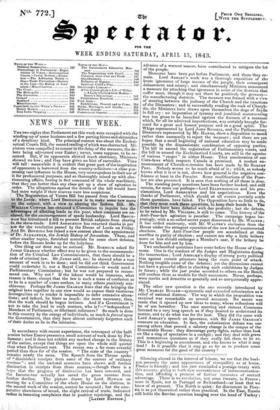advance of a warmer season, have contributed to mitigate the
lot of the people.
Measures have been put before Parliament, and there they re- main. Lord ASHLEY'S work was a thorough exposition of the brute ignorance of large masses of the people, their consequent debasement and misery; and simultaneously Ministers announced a measure for attacking that ignorance in some of the districts that
suffer most, though it may not there be positively the grossest—
the manufacturing districts. The measure was framed with a vlew of steering between the jealousy of the Church and the exactions of the Dissenters ; and in successfully evading the rock of Charyb- dis, the Ministers have drawn upon themselves the dogs of Scylla in full cry : no imputation of tyranny and jesuitical manceuvering was too gross to be launched against the framers of a measure which, for all its admitted imperfections, was certainly brought for- ward for a great and honest purpose and in a good spirit. The
Whigs represented by Lord JOHN RUSSELL, and the Parliamentary Dissenters represented by Mr. HAWES, show a disposition to mend rather than summarily to reject the measure ; and there are yet hopes that a small beginning of national education may be made possible by the dispassionate combination of opposing parties. The bill to amend the registration of Parliamentary voters, and the bill to amend the Ecclesiastical Courts, are still in the agonies of various "stages" in either House. That amelioration of our Corn-laws which respects Canada is promised. A modest an- nouncement of Church-extension has been made by Sir ROBERT PEEL. Nobody seems to be much afraid of it ; which, as nobody knows what it is or is not, shows how general is the negative con- fidence at least in the Premier. Some modifications of the Poor- law are also promised. It is seen that nothing of all these is done.
The standing party questions have been further hacked, and still remain, for more use perhaps—Lord ELLENBOROUGH and his pro- clamations, Lord ASHBURTON and his negotiations. Even the thanks of Parliament, which should at all events partially settle those questions, have failed. The Opposition have so little to do, that they must work these questions, to keep their hands in. The Corn-laws have been debated with due prolixity ; but the debate, to be raised by Mr. Visa.rEas, is still to come. The history of the Anti-Poor-law agitation is peculiar. The campaign began im- posingly, with a so-called secret paper discovered by Mr. WALTER; it has ended ominously, with Mr. WALTER'S exclusion from the House under the stringent operation of the new law of controverted elections. The Anti-Poor-law people are scandalized at this sacrifice to purity of election ; and cannot see why a little bribery more or less should endanger a Member's seat, if the bribery be done for him and not by him.
Two unclassified questions have come before the House of Com- mons. One is the conduct of the Judges and Magistrates during the insurrection; Lord ABINGER'S display of strong party political bias against certain prisoners being the main point of attack. Nothing tangible came of the debates ; yet the discussions cannot but have a powerful effect in checking such exhibitions by Judges in future ; while the just praise accorded to others on the Bench will confirm them as models for their successors. Never, perhaps, were merits and demerits so generally and so unequivocally appre- ciated.
The other new question is the one recently introduced by Mr. CHARLES BULLER—systematic and extended colonization as a relief of national distress. The way in which the proposition was received was remarkable on several accounts. No secret was made that it opened up new ideas to many, whose reflections will be of use hereafter. The once sneering and riotous Commons listened to a very long speech as if they desired to understand its matter, and to do what was for the best. They did the same with Lord ASHLEY'S speech on ignorance, with Sir JAMES GRAHAM'S
measure on education. In fact, the colonization debate was one among others that proved a salutary change in the temper of the Honourable House: they discourage party-fights, rather than look on like a ring of spectators in a cockpit ; and they deal with grave and momentous questions as if they really felt them to he so. This is a beginning in amendment, and who knows to what it may lead ? Is it possible that it may go so far as to produce some great measures for the good of the country ?


















































